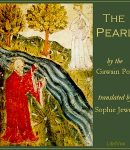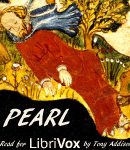
Pearl (Jewett translation)
Written in the 14th century by the Gawain poet, ‘Pearl’ is an elegiac poem reflecting on the death of a young daughter, pictured as a pearl lost in a garden. It is considered a masterpiece of Middle English verse, incorporating both the older tradition of alliterative poetry as well as rhyme, centered around the development of an intricately structured image. Sophie Jewett’s translation from the Northern dialect of the original renders much of the poem’s liveliness and beauty accessible to modern readers, whilst encouraging them to pursue their reading further, to read the original itself. This recording is dedicated to the memory of Pearl Jean Shearman, 1914-2012. (Summary by Jordan) [chương_files]
